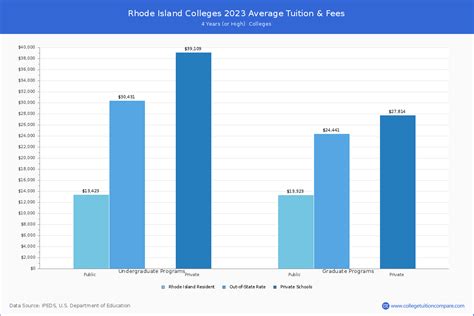For generations of students, Rhode Island College has been a beacon of higher education, empowering individuals with knowledge and skills that ignite their futures. Embarking on a journey at RIC entails an investment in both academic and financial resources. To assist you in navigating the complexities of college expenses, we have meticulously compiled an in-depth guide that unravels the intricacies of tuition costs, fees, financial aid, and scholarship opportunities.

Understanding Tuition and Fees at Rhode Island College
Undergraduate Tuition:
- In-State: $12,556
- Out-of-State: $22,588
Graduate Tuition:
- Master’s Programs: $14,973
- Doctoral Programs: $19,543
Additional Fees:
- Student Activities Fee: $300
- Technology Fee: $230
- Health Service Fee: $250
Financial Aid: A Lifeline of Support
Rhode Island College is committed to making education accessible to all who seek it. To this end, the institution offers a comprehensive suite of financial aid programs designed to alleviate the financial burden of college expenses.
Types of Financial Aid:
- Grants: Free money that does not need to be repaid.
- Scholarships: Merit-based awards that recognize academic excellence or other achievements.
- Loans: Money that must be repaid, but often at low interest rates.
- Work-Study Programs: Provide on-campus employment opportunities to help students earn money for their education.
Scholarship Opportunities at Rhode Island College
RIC offers a plethora of scholarship opportunities to deserving students. These awards range from merit-based scholarships, such as the Presidential Scholarship, to need-based scholarships, such as the Pell Grant.
Available Scholarships:
- Presidential Scholarship: Up to $20,000 per year
- Alumni Scholarship: Up to $10,000 per year
- Rhode Island Promise: Full tuition coverage for eligible in-state students
- Pell Grant: Federal need-based grant for low-income students
Tips and Tricks for Maximizing Financial Aid
- Apply for the FAFSA: The Free Application for Federal Student Aid is the gateway to most financial aid programs.
- Explore External Scholarships: Search for scholarships offered by organizations, businesses, and private foundations.
- Negotiate with the Financial Aid Office: In some cases, you may be able to negotiate a better financial aid package by providing additional documentation or appealing your award.
Common Mistakes to Avoid
- Missing Deadlines: Deadlines for financial aid applications and scholarship submissions are crucial. Missing these deadlines can jeopardize your chances of receiving assistance.
- Not Exploring All Options: Many students only consider federal financial aid programs. Explore all available options, including institutional grants, scholarships, and work-study programs.
- Ignoring Financial Aid Terms: It’s important to carefully review the terms and conditions of your financial aid awards. Failure to comply with these terms can result in the loss of aid.
Frequently Asked Questions (FAQs)
1. What is the average cost of attendance at RIC?
For in-state students, the average cost of attendance is approximately $30,000 per year. For out-of-state students, the average cost is approximately $44,000 per year.
2. What is the deadline for financial aid applications?
The priority deadline for submitting the FAFSA is March 1st. However, it’s recommended to apply as early as possible to maximize your chances of receiving aid.
3. How do I apply for a scholarship?
Scholarship applications are typically submitted through the RIC Office of Scholarships and Financial Aid. Visit their website or contact their office for more information.
4. What are the eligibility requirements for the Pell Grant?
To be eligible for the Pell Grant, you must be a U.S. citizen or resident, enrolled in a degree-granting program, and meet income and asset requirements.
Table 1: Undergraduate Tuition and Fees
| Category | In-State | Out-of-State |
|---|---|---|
| Tuition | $12,556 | $22,588 |
| Student Activities Fee | $300 | $300 |
| Technology Fee | $230 | $230 |
| Health Service Fee | $250 | $250 |
| Total | $13,336 | $23,368 |
Table 2: Graduate Tuition and Fees
| Category | Master’s Programs | Doctoral Programs |
|---|---|---|
| Tuition | $14,973 | $19,543 |
| Student Activities Fee | $300 | $300 |
| Technology Fee | $230 | $230 |
| Health Service Fee | $250 | $250 |
| Total | $15,753 | $20,323 |
Table 3: Financial Aid Programs
| Type of Aid | Description |
|---|---|
| Grants | Free money that does not need to be repaid |
| Scholarships | Merit-based or need-based awards |
| Loans | Money that must be repaid, but often at low interest rates |
| Work-Study Programs | Provide on-campus employment opportunities |
Table 4: Scholarship Opportunities
| Scholarship | Amount | Eligibility |
|---|---|---|
| Presidential Scholarship | Up to $20,000 per year | High academic achievement and leadership |
| Alumni Scholarship | Up to $10,000 per year | Graduating high school seniors who are children of RIC alumni |
| Rhode Island Promise | Full tuition coverage | Eligible in-state students who meet certain income requirements |
| Pell Grant | Varies based on need | Eligible low-income students who have not earned a bachelor’s degree |
